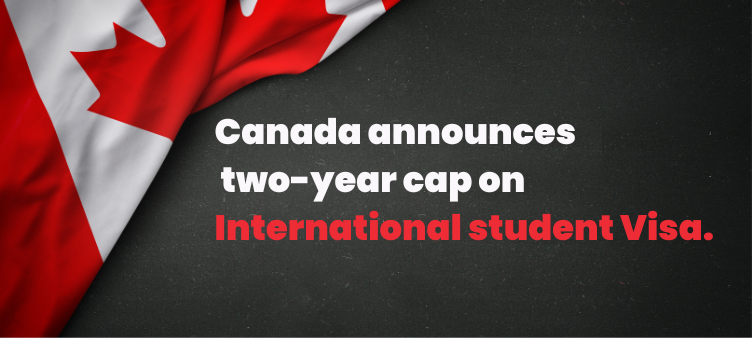Our Blogs
Canada announces two-year cap on international student visas – January 22, 2024

Canada sets a two-year cap on foreign students.
The Canadian government is getting a lot of criticism for how it’s managing immigration due to a surge in the number of immigrants and a housing crisis. The government is considering putting limits on visas for international students and temporary workers. The immigration minister acknowledged the situation, saying it’s a system that has gotten out of control. A public poll shows that many Canadians think immigration is causing the housing crisis and straining healthcare and education. While many still support immigration for cultural diversity and workforce contributions, there’s a growing number of people who want fewer immigrants coming to Canada.
When and how would a cap come into effect?
Effective on 1 September 2024 the students who are going to Canada to begin their study program will no longer eligible for a post-graduation work permit upon graduation level.
Immigration Minister Marc Miller plans to examine and improve control over the number of international students entering Canada in the first half of 2024. In the latter part of 2023, the government tightened its rules for student visas. Now, Miller’s department will closely assess the actions of specific academic institutions in different provinces. Discussions on reducing international student numbers will be held in collaboration with provincial governments to ensure effective communication and coordination.
In Canada, the authority to decide which schools can host international students with student visas lies with the provinces, not the federal government. However, the federal government manages the student visa system and is contemplating negotiations with provinces for a nationwide cap on student numbers.
Immigration Minister Marc Miller is expressing concern about the current system’s integrity, citing instances where some institutions exploit lax regulations by charging high fees without delivering the promised education. In discussions about implementing a cap, the needs of academic institutions will be considered. Canadian universities heavily depend on international student enrolment for financial stability, and while Miller hasn’t specified the cap, there were over 800,000 international students in 2022, with an expected increase to 900,000 in 2023. Colleges and Institutes Canada stressed the importance of measures that consider regional differences to avoid negatively impacting the sector, which plays a crucial role in contributing to diversity and Canada’s economy.
How would the cap affect Indians?
Canada in recent years, has received an influx of Indians who form one of the largest groups of international students in the country.
Over 41% – or 225,835 – of all permits were handed over to Indians in the year 2022.
In September 2023, nearly 40% of international students allowed in Canada were from India, according to government statistics. Immigration Minister Marc Miller has announced plans for a cap on the number of incoming international students, citing the current volume as overwhelming and in need of significant reduction. It’s important to note that the cap won’t affect those within Canada extending their studies or existing study permit holders. The cap will specifically apply to those applying for study visas for bachelor programs or diplomas, with exemptions for students applying for master’s and PhD programs. Miller emphasized that the cap is intended to manage the influx of new students and won’t hinder those already in the country.
Get in touch with SPS Canada
Receive professional advice on any of your questions regarding Canadian immigration. get in touch with us, experienced immigration consultants from SPS Canada. For additional information, contact support@spscanada.com (Canada) or support.amd@spscanada.com
(Ahmedabad), or by phone at (1) 905-362-9393 (Canada) or +919586226232 (Ahmedabad)
Comments
Our Clients
We're Trusted Globally
We are a regulated immigration practicing firm, providing advice and
solutions on matters related to Canadian immigration.














